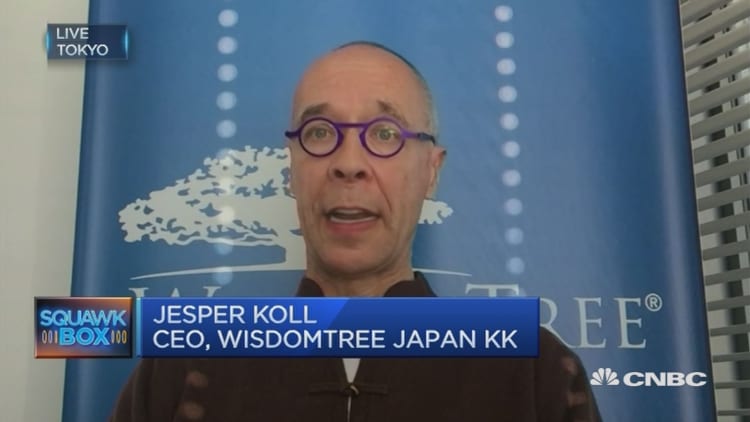The U.S. Securities and Exchange Commission (SEC) said on Tuesday it obtained a court order last month to freeze the assets of unknown traders who posted more than $3.6 million in profits on potential illegal insider trading before Softbank announced a deal to acquire Fortress Investment.
The SEC has alleged that unknown customers of Singapore-based broker-dealer Maybank Kim Eng Securities and U.K.-based broker-dealer R.J. O'Brien Ltd. possessed material non-public information on the deal and purchased Fortress derivative securities known as contracts for difference (CFD). CFDs are prohibited in the U.S.
After the market close on February 14, Japan-listed Softbank announced plans to acquire Fortress Investment for around $3.3 billion, or $8.08 a share, a nearly 39 percent premium over Fortress' closing share price on February 13. On February 15, Fortress shares surged nearly 29 percent to close at $7.99.
The Singapore-based broker-dealers' customers purchased 950,000 Fortress common shares on February 14 before the market close and then entered orders to sell those shares the next day before markets opened for an around $1.7 million profit, the SEC statement said.
"We are currently assisting, and extending our full cooperation to the relevant authorities investigating this matter. We wish to clarify that neither Maybank Kim Eng nor any of its employees is a party to this litigation," Maybank Kim Eng said in a statement to CNBC Asia.
The U.K.-based broker-dealers' customers bought Fortress CFDs from February 10-14, representing around 1.055 million Fortress shares, then closed most of those contracts on February 15 for a profit of around $1.9 million, the SEC said.

A representative of R.J. O'Brien Ltd., the U.K. affiliate of R.J. O'Brien & Associates, said via email, "As a matter of policy, the firm does not comment on regulatory matters or litigation."
It added, "The firm is neither a defendant in the complaint nor in any way a target of the investigation. RJO and its affiliates conduct no proprietary trading for the firm's profit. The RJO Limited name came up as the trading firm holding the funds and positions for the customer(s) who are being investigated."
The statement added that RJO cooperated with the SEC and the customer funds were frozen.
"The timing, size and profitability of these trades are highly suspicious," the SEC's court filing said, noting that information from Fortress indicated the deal's consummation was in "serious doubt" as late as February 12.
On February 14 at 11:02 a.m., Fortress' board of directors received an email that included draft resolutions approving the deal and the defendants with Maybank Kim-Eng accounts began buying stock at 11:35 a.m., the SEC filing said. Then all the shares were sold on February 15, with a less than 24-hour holding period, the filing said.
The RJO customers began buying Fortress-based CFDs on February 10, just prior to a tentatively scheduled Fortress board meeting on February 12 to approve the deal, the filing said.
The Fortress board was then told at 5:45 p.m. on February 13 that a board meeting would be held the next day on the Softbank deal, the filing said.
The RJO customers bought more CFDs on Feb. 13 and again on the morning of Feb. 14, the filing said.
Fortress didn't immediately return CNBC's emailed request for comment, which was sent outside office hours. Softbank declined to comment.
The court order froze the traders' assets and the SEC was seeking a judgement ordering the traders to disgorge the profits with interest and to pay financial penalties, the SEC said.
Clarification: This story has been updated to clarify that the frozen accounts at RJO Ltd. were customer accounts and the defendants were not RJO employees.
—Melissa Goh and Dan Murphy contributed to this article.


